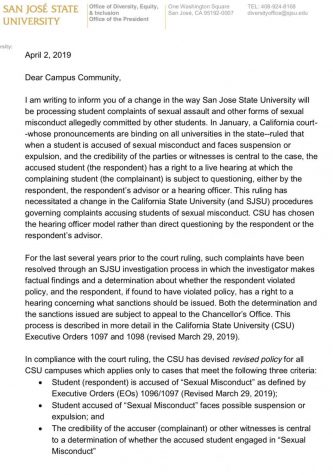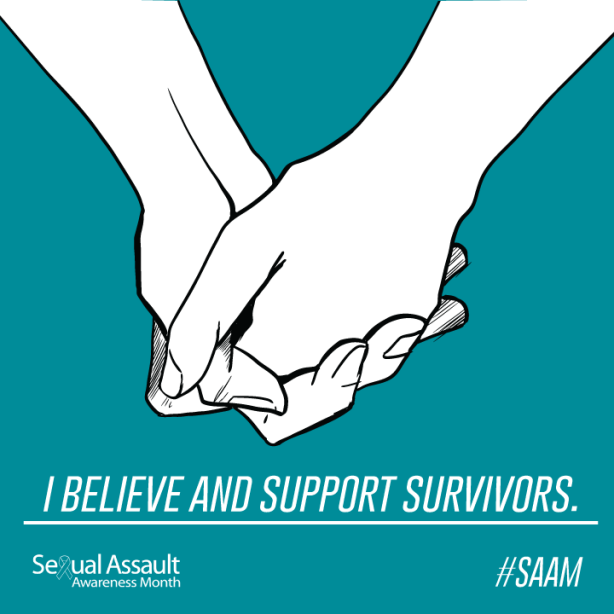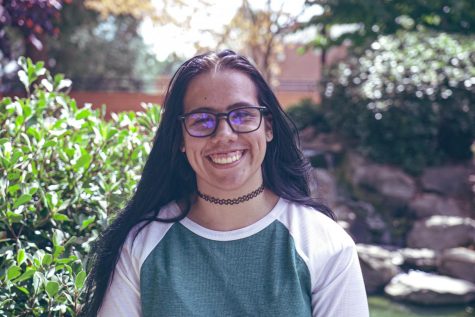Sexual assault victims are facing new horrors in 2019
In a society that shames and intimidates victims, it is vital to believe those impacted by sexual assault. (Photo courtesy of Susan Sullivan).
April 8, 2019
DISCLAIMER: The following opinion column includes graphic details and excerpts regarding sexual assault. Please read with caution. For those struggling with sexual assault, be advised that your voice matters. You can call 1-800-656-4673, the National Sexual Assault Hotline that is open 24 hours a day.
Sexual assault changes you. You are constantly looking over your shoulder, your guard is always up. There is no moment of peace. You feel powerless. You feel ashamed, you feel dirty—you feel as if society sees you as scum. They will say to you:
“You asked for it.”
“Well maybe if you were more careful, it wouldn’t have happened.”
“Look at what you were wearing.”
“You should have fought back.”
“You let it happen.”
“We’re you drinking?”
“But it wasn’t that bad, right? You like them.”
“You can just forget about it.”
They are wrong.
In my experience, I have seen first hand what sexual assault does to victims. One of my family members was violently raped at 16. She was followed by harassment and death threats forcing her to remain silent. Another relative of mine was assaulted by an older man who was 32 years older than her, she was 15 at the time. I have had multiple relatives in my life who have been raped—violated and made to feel less than human. Sexual assault has poisoned my family for generations. In a cruel way, it’s become the norm.
April is Sexual Assault Awareness Month. This month is one I hold dear, sexual assault has and always will be a very personal topic for me. Throughout my life, I have experienced different disparities—incidents that have forced me to mature faster than my peers. But none have hit me harder than sexual assault. That being said, while the dialogue about sexual assault, harassment, and misconduct has been more vocalized in recent years due to the #MeToo movement, we need to do better.
On April 2, San Jose State University—alongside other CSUs–are now requiring victims of sexual misconduct to testify through a live hearing with their accused attacker in the room. When I heard of this news, a pit in my stomach turned. I felt sick, disgusted, and outraged. To be forced into an environment of intimidation, with the face of your perpetrator upon you is horrifying. According to KPIX 5, a judge ruled that “any student accused of sexual misconduct who faces expulsion or suspension has a right to a live hearing, especially when the credibility of the victim and witnesses is central to the case.”

Yes, it is always vital to have a fair trial regarding any accusation. One should always experience due process. However, there is something about coming forward to sexual assault that isn’t discussed openly. Why is it that we jump to doubt the validity of accusations? Why is it that we are so quick to not trust victims? Over the past twenty years, according to BBC, only 2% of sexual assault accusations are false. They are extremely rare. So, why is it that we assume accusations are more common than they are?
By implementing this new hearing, SJSU is failing their students who have or will experience sexual assault on their campus. Students will be scared to come forward, they will be reluctant and intimidated.
You’re in the most vulnerable state imaginable after being assaulted, you feel alone and backed into a corner where you’re taught to be silenced. When anyone does come forward in the media, there is always backlash. Hundreds of people online putting victims on blast:
“They’re just doing it for the fame.”
“They’re just after (insert media icon here).”
“Why bring these accusations up now?”
“(Insert media icon here) could never do something like that. They must be lying.”
If an individual comes forward about sexual assault, they risk their own reputation. They have to develop a thick skin in order to face backlash. Sexual assault is seen as a taboo, an uncomfortable conversation. Victims are forced to defend their character and who they are. Survivors and victims are everyday people. Our society forgets that when individuals come forward they are at stake mentally and emotionally. By speaking up about your sexual assault, you allow yourself to be vulnerable—to be hurt like you were before.
According to the National Sexual Violence Resource Center, 1 in 5 women will be raped at some point in their life. 20%-25% of those women and 15% of those men were assaulted in college. NSVRC also cited that more than 90% of victims that are assaulted on campuses do not report their cases. The NSVRC also found that sexual assault is the most underreported crime in the United States with 63% of assaults never being reported to police.
Sexual assault is centered around power. It is not caused by sexual attraction. According to the University of Michigan’s Sexual Assault Prevention and Awareness Center, “people commit sexual assault because they feel entitled to other people’s bodies and disregard other people’s right to consent.” So, when students like Jack Montague from Yale University files a lawsuit claiming discrimination in his hearing process, despite being found guilty of “penetration without consent”, and colleges bend backwards by changing their hearings to be “fair” to the accused; you’re giving perpetrators the power they seek. This new process gives the accused more power than the victims coming forward, it is not them they have to prove themselves to be innocent—but the ones who have been violated and traumatized.
Brock Turner, the Stanford rapist who only served half of a six month sentence for assaulting a female student in 2015, walks free today. Turner sexually assaulted an unconscious woman on January 27, 2015. He assaulted violently her behind a dumpster. Her story is graphic. It is raw—but real.
“I still remember the feeling of my hands touching my skin and grabbing nothing. I looked down and there was nothing,’” The survivor of Turner’s attack wrote in a letter read at Turner’s hearing, recounting her experience after she was assaulted. “The thin piece of fabric, the only thing between my vagina and anything else, was missing and everything inside me was silenced. I still don’t have words for that feeling. In order to keep breathing, I thought maybe the policemen used scissors to cut them off for evidence. Then, I felt pine needles scratching the back of my neck and started pulling them out my hair. I thought maybe, the pine needles had fallen from a tree onto my head. My brain was talking my gut into not collapsing. Because my gut was saying, help me, help me.”
A feeling of extreme discomfort when one is sexual assault is common, if not guaranteed. Her story is like many others, what she feels is the same as everyone who has ever been violated by sexual assault. She is not alone.
The survivor recounted her initial thoughts after discovering she was assault in the letter.
“I don’t want my body anymore,” she wrote. “I was terrified of it.”
This feeling is synonymous for every individual who experiences sexual assault. We need to acknowledge that not only as a society but as a country.
When Secretary of Education Betsy Devos claims that she “believes college sexual misconduct systems discriminate against men because they deny the men due-process rights” according to Business Insider, we should be revolted. Victims have been swept aside and not even acknowledged in the conversation.
Even in the highest courts of the country, victims aren’t being listened to and undermined. Despite providing detailed allegations against now member of the United States Supreme Court, Brett Kavanaugh, Christine Ford did not rise above. Our country failed Ford. Our country failed every survivor and victim of sexual assault after that hearing.
We need to believe victims and survivors. We need to call out the preparators and let our society know that sexual misconduct is something that an individual can’t get away, something that one can’t buy or intimidate their way out of. We need to let them know that they aren’t alone, to let them know what happened to them isn’t their fault.







































































